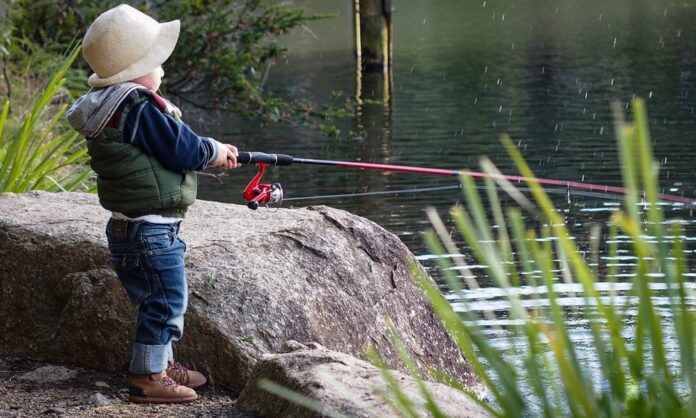
Fishing is a fun and fulfilling activity, but it also gets your kids outdoors and connects with the environment. With a little preparation and patience, it shouldn’t be long before your kids reel in their very first catch.
Fishing is both fun and therapeutic activity and there is no reason why it should be considered only for adults. Kids can very often enjoy this activity and most of them take it in as very interesting and fun and end up with a rod in their hands more than a smartphone or a computer mouse or a joystick.
Since we are in that period where our kids try to find every excuse to stay indoors, we need to double down on our efforts in finding ways to get them outside. Nature is awesome and everyone should learn and enjoy it however they can.
There are few things more rewarding than bonding with your little ones, especially around nature, where there are no distractions. Here are five simple tips to make fishing with your youngsters easier, as shared by the StuckFishing.com site.
Why Fishing?
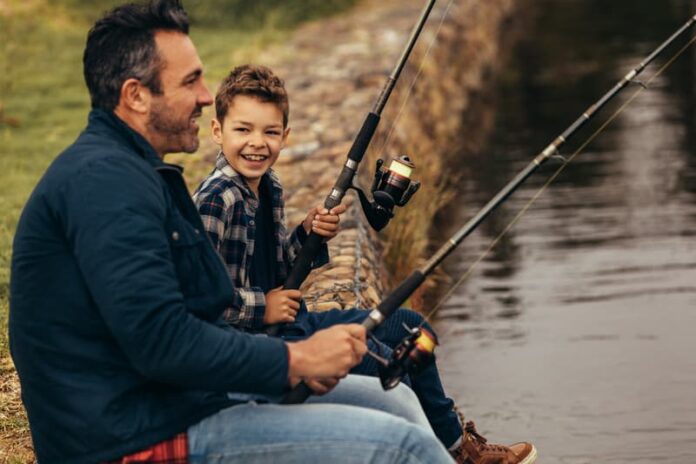
You may get why fishing is the perfect outdoor activity for adults, but kids?
Yes, fishing happens to be a great hobby to introduce to children. That’s due to its non-discriminatory nature, which many believe to be one of its greatest facets.
True enough, fish don’t care how small or big, or young or old, you are; if you present them with bait properly, chances are they’re going to bite. That means children as young as two should be able to start fishing with proper guidance and supervision.
Now that you have the green light to teach your child fishing, it’s important to know that there’s a right and wrong way to do it. Of course, you know which we’ll focus on in the next section.
The Right Way To Fish With Kids
When it comes to fishing with kids, your approach determines whether the activity becomes a safe and enjoyable experience for both.
Ready to ensure this is the case for you? Let’s begin!
1. Start them young but don’t rush the process
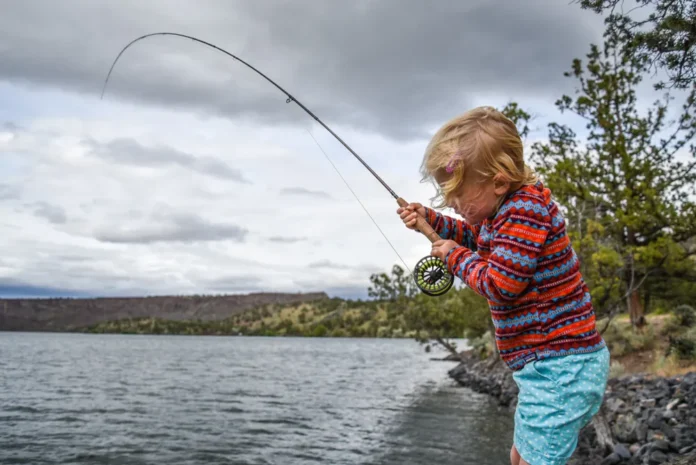
If you watch your kids carefully from the moment they grow up they are constantly on the lookout for sticks and branches they can swing around. It is fun and interesting for them but it is also evolutionary so you shouldn’t discourage them from it, the best idea is to, as soon as you see them making interest in sticks and branches, find an improv, or even make one, fishing rod and let them swing it around.
How young is too young for fishing? There’s only one way to find out. If your little one shows an interest in the sport, take him out on a few of your fishing trips to gauge how involved he’s willing to be.
That said, a preschooler isn’t one to be fine with sitting for hours on a boat waiting for fish that clearly aren’t in the mood to play. You know the drill when it comes to these things, but they don’t — and that could make for a stressful time in the water for both you and your little angler.
Starting your kids young is a great idea, but make sure you don’t rush them through the process. Get a feel for where they’re at and how they want to proceed. They might find walking around the lake more fun at this point, so let them. Seeing you catching fish as they do will eventually pique their curiosity.
The first time your child decides he wants to catch fish, plan a short trip. It’s never a good idea to overexpose kids to fishing too early. Let them ease into it.
Pick a day when the weather is ideal, and you already have a child-friendly place in mind where your little one is certain to get a catch. There’ll be time for the big game later; focus on making sure your child is getting frequent-enough bites to keep him entertained.
2. Plan your trip with your child in mind
Most of us do not plan our activities around kids, or we are expecting them to adapt to our plans as much as they can. Whenever you are going in nature or anywhere else that is considered outdoors you need to plan around them and their needs if you want your trip to succeed.
There’s no telling what can happen on the day of your fishing trip. The weather could turn sour, your child might suddenly not be in the mood for fishing when you arrive, or the fish may decide not to show.
To ensure you can still salvage the day, make your first few fishing trips as easy as possible for you and your child—the key to choosing the ideal locations for fishing with children, such as beaches and jetties. These places are child-friendly, but they also hold facilities like bathrooms, snack and shelter areas, and playgrounds.
Even when your fishing trip is ruined (it happens), your child’s day isn’t.
3. Life jackets are a must
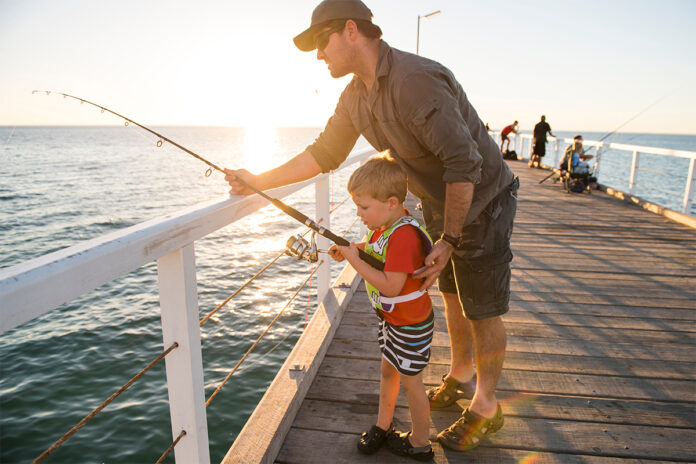
Safety is imperative no matter if you are alone or with your friends. When kids are involved having them wear all kinds of safety gear made for different activities is a no-brainer.
Wearing life jackets is non-negotiable. Make sure your little ones wear them as they’re learning to fish. Be a good role model and wear them, too. Your kids need to know early on the importance of safe fishing.
4. Stick to easy targets
Kids never react to force or push too hard. This is true in any activity that is suitable for them. When it comes to fishing nothing they do or catch is small or unimportant and everything you try to teach them has to be planned and made according to what they would consider fun and appealing.
As we said, there’ll be time for trophy-sized game fish in the future. Now, you need to focus on targeting smaller and actively feeding species.
Trout and Panfish should be an excellent place to start. Not to mention, there are plenty of them swimming around the docks. Grab your gear and start your kids’ first fishing lesson with little fuss and bother.
5. Gentleness is important
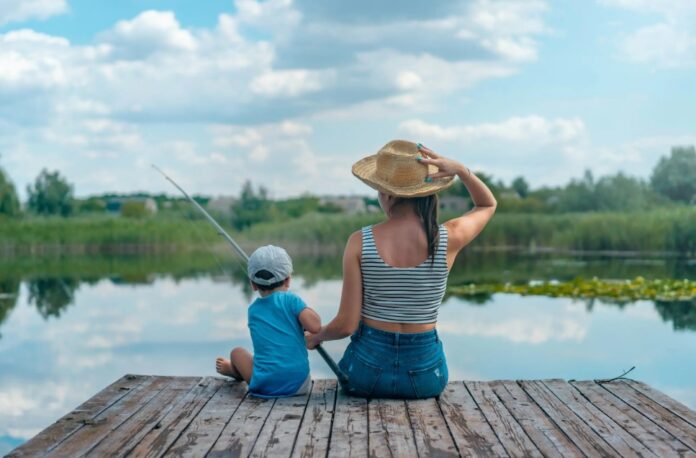
Making them fall in love with nature and everything it has to offer us is important. There is another thing more important than that is you explaining to them and learning to them what respect toward nature is and how it should look.
Kids should be taught from an early age to be gentle with nature. They should know when to release fish and when to bring them home.
If your child is younger than 12, make sure you’re the only one releasing the fish back into the water. Show them how the hook is removed and how the fish is submerged and resuscitated.
When your kid’s hands are large enough, they should be able to do it themselves. Guide them as they do, making sure they keep a grip firm enough to perform the necessary steps and gentle enough to not hurt the animal.
There you have it — five easy tips for fishing with your kids! Now, what are you waiting for?! Tell your kids what you have planned for the weekend. Now that you know all that you need to, it will be a fun time for everyone.











